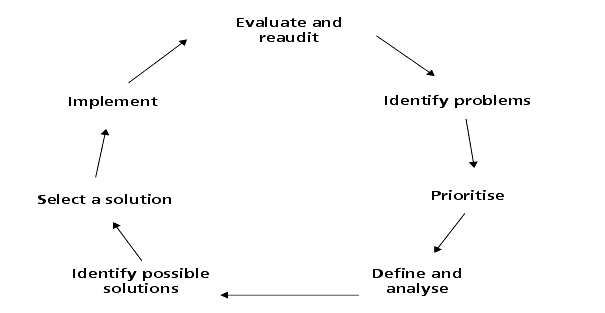
Annex A > Chapter 18 - Medical and Clinical Audit > Audit: the national perspective
<< previous | next >>
Audit: the national perspective
Defining audit
5 There are many definitions of audit, but the most widely cited in the UK during the period of the Inquiry's Terms of Reference was the definition given by the DoH in 1989:
`... the systematic, critical analysis of the quality of medical care, including the procedures used for diagnosis and treatment, the use of resources, and the resulting outcome and quality of life for the patient.' [1]
The assessment and then the improvement of quality are widely regarded as forming a cycle of activity (see Figure 1 below) which together produce continuing improvements in quality. [2]

6 The setting of standards against which to measure activities and performance was seen as a key aspect of audit. Miss Lesley Salmon, General Manager of Obstetrics, Gynaecology and ENT at the BRI from October 1994 to date, observed:
`The setting of standards is something that runs throughout the Health Service. In a sense, it is the first step in audit, in that if you were going to audit your performance, generally speaking you would be within a department or a service setting standards to then measure yourself against to ensure you were meeting the standards already set, whether they were clinical or non-clinical standards. Audit is then auditing your performance against the standard that has been set and it can be either one internally you have set or it can be something that compares you to other services, similar services, elsewhere.' [3]
7 This aspect of audit, the concern for measuring conduct against agreed standards, is not prominent in the 1989 definition set out in para 5, above. During oral evidence, Counsel to the Inquiry referred Sir Barry Jackson [4] to that definition in para 5, and compared it to the definition of audit set out in the Royal College of Surgeons of England (RCSE) paper. The Royal College explicitly included the question of prescribed targets and standards, stating:
`Audit is the systematic appraisal of the implementation and outcome of any process in the context of prescribed targets and standards.' [5]
`... I think at the time these documents were written there was no clear understanding amongst everybody as to a uniform meaning of the term "audit". ... I also know that in the minds of surgeons and other doctors, not just surgeons, throughout the country, there was enormous confusion as to what audit actually was and to how it should be used, and its importance. There is no doubt at all in my mind that the definition that you see on the screen currently is the correct definition of "audit", that is to say, it is a systematic appraisal or analysis, if you wish, of any particular process in the context of a prescribed standard which has been set, a comparison of what is actually being done against that standard or target which has previously been identified, and that should there be a disparity, then measures should be put into place to rectify the disparity, or alternatively, to change the standard or the target which might of course be incorrect. ... I think that some of the confusion may have arisen between these three terms, "audit", "medical audit", and "clinical audit". I say no more than that because I think it was a very confused area. I think it is still confused to some extent in the minds of many, even today'. [6]
9 Sir Barry Jackson said that:
`The setting of the standards have created considerable problems in many areas, and in 1989/1991 those standards in most instances were not recognised; therefore, to all intents and purposes, they did not exist. This is where I think some of the confusion has arisen as to what one is meaning by "audit" because so often what was perceived as audit - and I have to say, going back to the HRC [Hospital Recognition Committee] and the SAC [Specialist Advisory Committee] visits ... the audit that they were looking at was probably not audit in the true sense of the word; in other words, comparing against an accepted standard.' [7]
<< previous | next >> | back to top
Footnotes
[1] HOME 0003 0127; DoH, `Working for Patients: Working Paper 6'. London: HMSO, 1989
[2] Fowkes F. `Medical audit cycle: a review of methods & research in clinical practice'. `Medical education' 1982; 16: 228-38. Illustration reproduced with the kind permission of Blackwell Science Ltd
[4] WIT 0048 0001 Sir Barry Jackson, President of the Royal College of Surgeons of England, from July 1998 to date
[5] WIT 0048 0117 Sir Barry Jackson